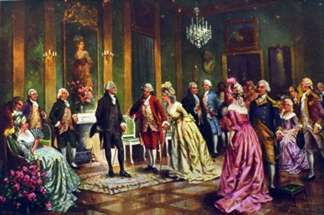MANNERS

Americans were less deferential than their European counterparts. As the early nation developed, the practice of bowing and making other outward signs of respect and subordination fell out of favor, especially in the informal West. The handshake, a greeting of equality, became the common greeting. Nevertheless, children were still required to make outward signs of respect to elders, like doffing a hats or making a bow or courtesy.
Most Americans were generally disdainful of aristocratic manners. Many farmers of the Southern up-country disapproved of what they saw as the pretensions of some of the wealthy plantation families. American tavern residents laughed at the haughty airs of European visitors.
Some accused the Society of the Cincinnati for being elitist and exclusionary, and for attempting to emulate the inherited titles of European aristocracy. Founded by officers of the Revolutionary War in 1783, the Society of the Cincinnati was arranged so that the oldest male descendant in succession of a Revolutionary War officer would inherit membership. It was named after the famous Roman general, Lucius Quinctius Cincinnatus, who was called from his small farm to defend Rome from attack. Declared dictator of Rome (519? B.C. - 439? B.C.), he mobilized troops, defeated the attackers, and resigned from the dictatorship to return to his farm, all within 16 days.
Through the Society, the Roman's life of service was to be a model for the Revolutionary War officers and their descendants. The primary purpose of the organization was to lobby for the rights of veterans. Protests against the aristocratic pretensions of the organization came from across the country, even though George Washington himself was president of the Society. One such complaint came from the Massachusetts legislature, which was concerned that the Society would be "dangerous to the peace, liberty and safety of the United States." As a result of national complaints, the Society eventually gave up its political activities and became a social club.
Differing views toward manners were often associated with political party philosophies. Federalists were generally more elitist, formal and aristocratic than their informal Democratic-Republican colleagues. Even President Washington was censured for the "courtly" manners maintained at social functions. Adams was even more formal than Washington. Mrs. Adams had been presented at court when Adams was minister to Great Britain, and she wanted to introduce British courtly manners to presidential social functions. With the end of the Federalist administrations came the end of many of the excesses of formality in which they had indulged.
Jefferson and the Democratic-Republicans brought with them an informality that alarmed many of their colleagues. Jefferson answered the door to the White House himself, sometimes dressed in old clothes and shoes with his toes sticking out. He allowed his grandson to run around barefoot in the summer, which did not impress British visitors.
European visitors often accused Americans of having no manners because they disregarded certain practices, but held others as important. In reality, many Americans were eager to live by rules of etiquette, although their priorities were different from the Europeans of their time and Americans of our time. It was considered impolite to simply say "cut up the chicken" to eat: one had to say, "break the goose," "thrust that chicken," "spoil that hen," "pierce the plover, please," or some such appropriate phrase. At the same time, Americans travelers staying in inns did not think twice about being put two or more to a bed, usually with strangers.
Most cities and towns had no sanitation service, so garbage was thrown in the streets. Without indoor plumbing, Americans attended to their sanitary needs either by going outside and digging a hole, or using chamber pots and emptying them outside. Privies, or "necessary houses," were more prevalent in cold parts of the country, such as New England, in which "using the facilities" was more difficult in the exposed climate. Boston was one of the cleanest of the large cities in the country. Scavengers; carts and farmers collecting manure kept the streets relatively clean and orderly. There was still the smell of dead animals and decaying food from Faneuil Hall market and other locations, however.
One of the messiest popular practices was the chewing of tobacco, which had been prevalent since at least the early eighteenth century. Spittoons were gradually set up on steamboat, in saloons, in hotel lobbies, in railroad cars, in courtrooms and in homes. Nevertheless, since most people did not always reach their targets, the yellowish tobacco-tinted spit stained carpets, floors, walls and clothing across the nation. Since washing was not a major part of life for most Americans, many of these stains became permanent.
In such a diverse nation as the United States, there were different approaches toward manners. Some Americans, such as George Washington and many of the wealthy Southern planter class, maintained an ordered formality comparable to the courts of Europe. Others scoffed at such manners, and gloried in defying such "relics of monarchy." Still other fell somewhere in between, aspiring to better manners, while recognizing that the realities of their lives made elaborate etiquette impractical and pretentious.
 >
>